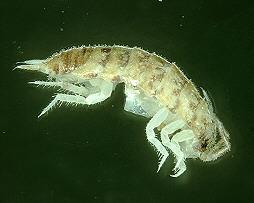Posted 2 October 2009

A new woodlice species whose distribution is restricted to mound springs in South Australia.
Australian researchers have discovered a huge number of new species of invertebrate animals living in underground water, caves and "micro-caverns" amid the harsh conditions of the Australian outback.
A national team of 18 researchers has discovered 850 new species of invertebrates, which include various insects, small crustaceans, spiders, worms and many others.
The team - led by Professor Andy Austin (University of Adelaide), Dr Steve Cooper (SA Museum) and Dr Bill Humphreys (WA Museum) - has conducted a comprehensive four-year survey of underground water, caves and micro-caverns across arid and semi-arid Australia.
"What we've found is that you don't have to go searching in the depths of the ocean to discover new species of invertebrate animals - you just have to look in your own 'back yard'," says Professor Austin from the Australian Centre for Evolutionary Biology & Biodiversity at the University of Adelaide.
"Our research has revealed whole communities of invertebrate animals that were previously unknown just a few years ago. What we have discovered is a completely new component to Australia's biodiversity. It is a huge discovery and it is only about one fifth of the number of new species we believe exist underground in the Australian outback."
Only half of the species discovered have so far been named. Generically, the animals found in underground water are known as "stygofauna" and those from caves and micro-caverns are known as "troglofauna".
Professor Austin says the team has a theory as to why so many new species have been hidden away underground and in caves.
"Essentially what we are seeing is the result of past climate change. Central and southern Australia was a much wetter place 15 million years ago when there was a flourishing diversity of invertebrate fauna living on the surface. But the continent became drier, a process that last until about 1-2 million years ago, resulting in our current arid environment. Species took refuge in isolated favourable habitats, such as in underground waters and micro-caverns, where they survived and evolved in isolation from each other.
"Discovery of this 'new' biodiversity, although exciting scientifically, also poses a number of challenges for conservation in that many of these species are found in areas that are potentially impacted by mining and pastoral activities," he says.
The research team has reported its findings at a scientific conference on evolution and biodiversity in Darwin, which celebrated the 200th anniversary of Charles Darwin: www.evolutionbiodiversity2009.org.
The team's research has been funded by the Australian Research Council (ARC) Environmental Futures Network.

Professor Andy Baker features in American Water Resources Association ‘Water Resources Impact’, September 2020 edition.

The Connected Waters Initiative (CWI) is pleased to welcome Taylor Coyne to its network as a postgraduate researcher. If you’re engaged in research at a postgraduate level, and you’re interested in joining the CWI network, get in touch! The CWI network includes multidisciplinary researchers across the Schools of Engineering, Sciences, Humanities and Languages and Law.

The Grand Challenge on Rapid Urbanisation will establish Think Deep Australia, led by Dr Marilu Melo Zurita, to explore how we can use our urban underground spaces for community benefit.

On the 21 August 2020, CWI researchers made a submission to the National Water Reform Inquiry, identifying priority areas and making a number of recommendations as to how to achieve a sustainable groundwater future for Australia.

Results published from a research project between the Land Development Department (LDD) Thailand and UNSW has demonstrated how 2-dimensional mapping can be used to understand soil salinity adjacent to a earthen canal in north east Thailand (Khongnawang et al. 2020).